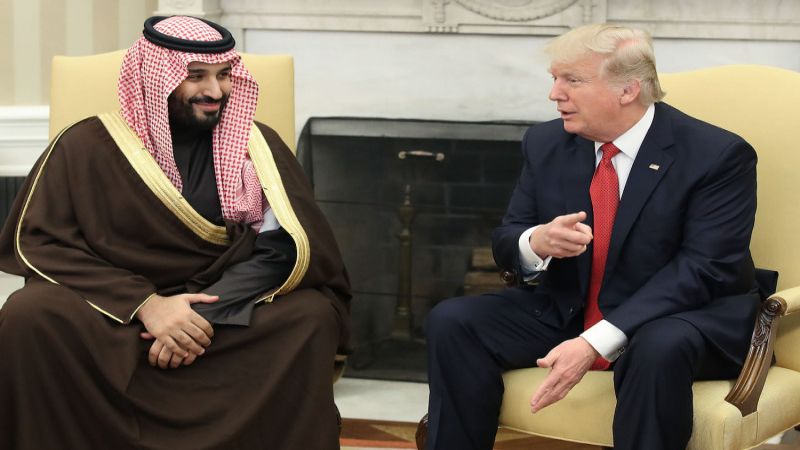
By Ben Freeman
Earlier this month, Congress passed a historic resolution to end U.S. involvement in the Yemen war, sending a harsh rebuke of the Saudi-led coalition that has helped cause the world’s worst humanitarian crisis. But on Tuesday, President Trump vetoed the resolution — a move that was expected but still disappointing. It’s abundantly clear that the United States shouldn’t be supporting the Saudi-led coalition, which has repeatedly used U.S. weapons in attacks that have killed civilians and even secretly partnered with al-Qaeda militants in Yemen, leading to a resurgence of the terrorist organization responsible for 9/11.
So why would Congress take so long to pass something so clearly in America’s interests — and why would Trump veto it? There’s a simple answer: the extraordinary influence of the Saudi lobby.
According to a new report from the Foreign Influence Transparency Initiative, which I direct, firms registered under the Foreign Agents Registration Act have reported receiving more than $40 million from Saudi Arabia in 2017 and 2018. Saudi lobbyists and public relations professionals have contacted Congress, the executive branch, media outlets and think tanks more than 4,000 times. Much of this work has been focused on ensuring that sales of U.S. arms to Saudi Arabia continue unabated and blocking congressional actions that would end U.S. support for the Saudi-led coalition in Yemen.
Lobbyists, lawyers and public relations firms working for the Saudis have also reported doling out more than $4.5 million in campaign contributions in the past two years, including at least $6,000 to Trump. In many cases, these contributions have gone to members of Congress they’ve contacted regarding the Yemen war. In fact, some contributions have gone to members of Congress on the exact same day they were contacted by Saudi lobbyists, and some were made to key members just before, and even on the day of, important Yemen votes.
For example, on Nov. 14, registered Saudi foreign agents at the McKeon Group — whose chief executive and namesake, Howard “Buck” McKeon, was the former chairman of the House Armed Services Committee — reported meeting with Sen. James M. Inhofe’s (R-Okla.) military legislative assistant to discuss the kingdom and making a $1,000 contribution to Inhofe’s campaign that same day. Two weeks later, Inhofe voted against a resolution to end U.S. involvement in the Saudi-led war in Yemen and vehemently opposed the Senate’s passage of the bill this year.
Earlier in 2018, on May 16, Sen. Robert Menendez (D-N.J.) and his chief of staff reportedly met a registered Saudi foreign agent with Brownstein Hyatt Farber Schreck to discuss the Yemen resolution and received a $500 contribution from BHFS lobbyist Elizabeth Gore that same day. Two months earlier, on March 20, Menendez voted to table a motion to end U.S. involvement in the Yemen war. Menendez also received a contribution from Squire Patton Boggs, another firm representing the Saudis, days before the vote. Similarly, just eight days before the vote, Sen. Heidi Heitkamp (D-N.D.) received a $1,000 contribution from the Glover Park Group, which was on the Saudi payroll at the time. (They dropped Saudi Arabia as a client in October.) And, in the four days before the March 20 vote, Sen. Bill Nelson (D-Fla.), received $3,000 in campaign contributions from BHFS, including one contribution on the same day of the vote.
All of these were key swing votes that were pivotal in keeping the United States in the Yemen war.
But things began to change for the Saudi lobby after the horrific murder of Jamal Khashoggi, a Post contributor and outspoken critic of the Saudi royal family, who was reportedly killed under the auspices of Saudi Crown Prince Mohammed bin Salman.
Several lobbying firms stopped taking Saudi money, as did some think tanks and U.S. universities. All of this considerably diminished Saudi influence, allowing the curtain to be pulled back on Saudi Arabia, and resulted in Congress finally doing the right thing — voting to end U.S. involvement in the Yemen war.
Yet while the Saudis’ investments in Congress have met with roadblocks, their storied courtship of Trump has continued. The Saudi lobby has been instrumental in keeping Trump on the Saudis’ side from the beginning of his presidency. Among many other ties, they’ve paved the way for the bond between the crown prince and Jared Kushner, Trump’s son-in-law, and helped to ensure that Mohammed met with Trump in the White House on March 20, 2018 — the same day Congress tabled a motion to get the United States out of the Yemen war. Saudi lobbyists even paid for an estimated 500 rooms at Trump’s Washington hotel just after he was elected president.
It’s now up to Congress to override Trump’s veto and end U.S. involvement in the Yemen war. If it does, the move would send a powerful rebuke to Saudi Arabia, signal that American foreign policy is not for sale and show that Congress, at least, is putting America first over the Saudi lobby.
Ben Freeman is the director and founder of the Foreign Influence Transparency Initiative at the Center for International Policy.
Source: The Washington Post, Edited by Website Team